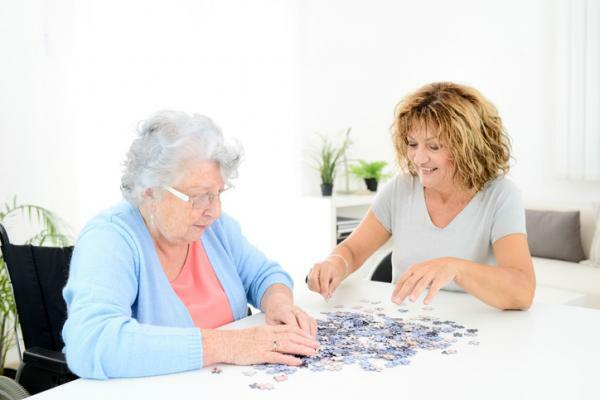
Each person sees the world from a different perspective depending on their personal resources and experiences that may have affected their perception of reality. A person raised in a family environment characterized by lack of love and economic deprivation probably will have a quite different vision than another who has had a calmer childhood and with the support of their loved ones darlings. When life gets difficult, we often go through moments of emotional anxiety that affect our personality.
Depression is a mental disorder that involves a lack of desire to carry out various daily activities and great difficulty coping with day to day life. Helping someone with this diagnosis can be difficult, but it is important to know the most effective methods of establishing good communication. In this Psychology-Online article, we will provide you with information about what to say and what not to say to someone with depression.
Index
- How to talk to someone with depression
- Phrases not to say to a person with depression
- What to say to a person with depression
How to talk to someone with depression.
The word "depression" is part of the colloquial language in which people usually handle themselves. This fact can give rise to confusion, since the characteristics implied by the clinical picture do not correspond to the common meaning of the term.
First of all, we must start by understanding what depression is. This concept refers to a state of mind characterized by the presence of feelings of sadness, hopelessness, frustration and anger that are manifested for a long time. According to the DSM-V[1], depression It can be related to several diagnostic criteria that must be met in order to determine this clinical condition. Here are some symptoms:
- Lack or decreased interest in daily activities.
- Sudden weight loss or gain.
- insomnia or hypersomnia.
- Fatigue.
- Lack of concentration and attention.
- Significant deterioration of work, social and family relationships.
- Symptoms lasting two or more weeks.
- The mood disturbances cannot be due to another mental disorder and/or the intake of medications or substances.
Knowing these symptoms is important to be able to differentiate a picture of depression from specific moments of sadness and/or anguish that can manifest with intensity.
Phrases not to say to a person with depression.
Due to the characteristics that we have displayed, it is important to understand that there are certain phrases that are not suitable for someone who has depression. Sometimes we try to help the person with certain words that can backfire. Next, we will exemplify this with 11 phrases that should NOT be said to a person with depression:
- "You have to enjoy life": these types of phrases can be understood as an order that must be fulfilled and generate frustration, since the person suffering from depression is unable to carry out activities that generate pleasure.
- "It's your decision to be like this": Depression is not a voluntary choice. Therefore, these words can cause a greater degree of anguish.
- "Do not be like that": in contrast to the previous sentence, the statement that the person should not have a state of Mood controlled by sadness and anguish can increase the intensity of the emotions that feel. Therefore, it is not advisable to address someone with depression in this way.
- "We all have problems": This statement is not helpful for the person with depression, who is focused on internal conflicts that prevent him from enjoying life. For this reason, it's not a good idea to mention to her that other people have trouble making her feel better because it will have the opposite effect.
- "Do not give importance to problems": We must emphasize that the problems that manifest in the present are a difficult obstacle to overcome for someone with depression. In addition, the possible consequences and difficulties appear maximized in depression, so it is not a voluntary process of making problems less consistent.
- "Life is wonderful": the person with a depressive picture has a painful perspective of life and considers that there are no reasons to move forward. Given this, wanting to demonstrate the opposite leads to the person not feeling understood in their suffering.
- "Could have been even worse": Although this phrase may aim to demonstrate that there are greater difficulties compared to those that the person goes through, it is not advisable to tell a person with depression, since it can generate insecurity and fear.
- "If you keep this up, you'll never get better": This comment can carry an enormous weight for those who are going through difficult times and can be very harmful, since, if the person takes it literally, they will believe that there is no improvement possible.
- "Life is to short to be this way": depression is related to a negative view of life. Therefore, emphasizing the duration of a mood will not help, since it can aggravate the feelings that the person has.
- "You have to be good for the people who love you": It is important to highlight that depression has a complex relationship with responsibilities. People who suffer from this picture feel that they cannot carry out any responsibility for feeling inferior to other people.
- "Stop pretending you're depressed": Misunderstanding and lack of empathy towards people experiencing this condition can be extremely harmful. It is important to properly choose the words with which we will address someone who is suffering.
What can you say to a person with depression.
Beyond the phrases that should not be said to someone with depression, there are other ways to communicate that are effective and can help the person who is going through difficult times difficult. Here are some phrases or expressions that can be of great help:
- "I'm here for whatever you need": Letting the person know that someone will be available to them allows for company that is not intrusive. Also, understanding that the person is not alone in the face of their pain can bring relief to the person with depression.
- "I understand what happens to you": In relation to the previous point, it is important to show empathy so that the person feels better. This happens because, in some way, the act of accompanying can be synonymous with tranquility.
- "How can I help you?": Showing understanding in the face of suffering can be very reassuring for people who suffer from depression.
- "You can get by": Emphasizing the positive aspects can help change the person's perspective on their own life. Therefore, showing him that he can be better will give him security.
- "You are a valuable person": In line with the previous sentence, explaining that you have value is a way of showing confidence. When a person trust herself, it is possible to achieve more objectives and goals in life.
This article is merely informative, in Psychology-Online we do not have the power to make a diagnosis or recommend a treatment. We invite you to go to a psychologist to treat your particular case.
If you want to read more articles similar to What to say and what not to say to someone with depression, we recommend that you enter our category of Clinical psychology.
References
- American Psychiatric Association. (2013). Diagnostic and Statistical Manual of Mental Disorders (5th ed.). Arlington: Pan American Medical Publisher.
Bibliography
- Botto, A., Acuña, J., Jiménez, J.P. (2014). Depression as a complex diagnosis. Implications for the development of clinical recommendations. Journal of Chilean Medicine, 142 (23), 1297-1305.
- Navas Orozco, W., Vargas Baldares, M. J. (2012). Approach to depression: crisis intervention. Dome Magazine, 26 (2), 19-35.


